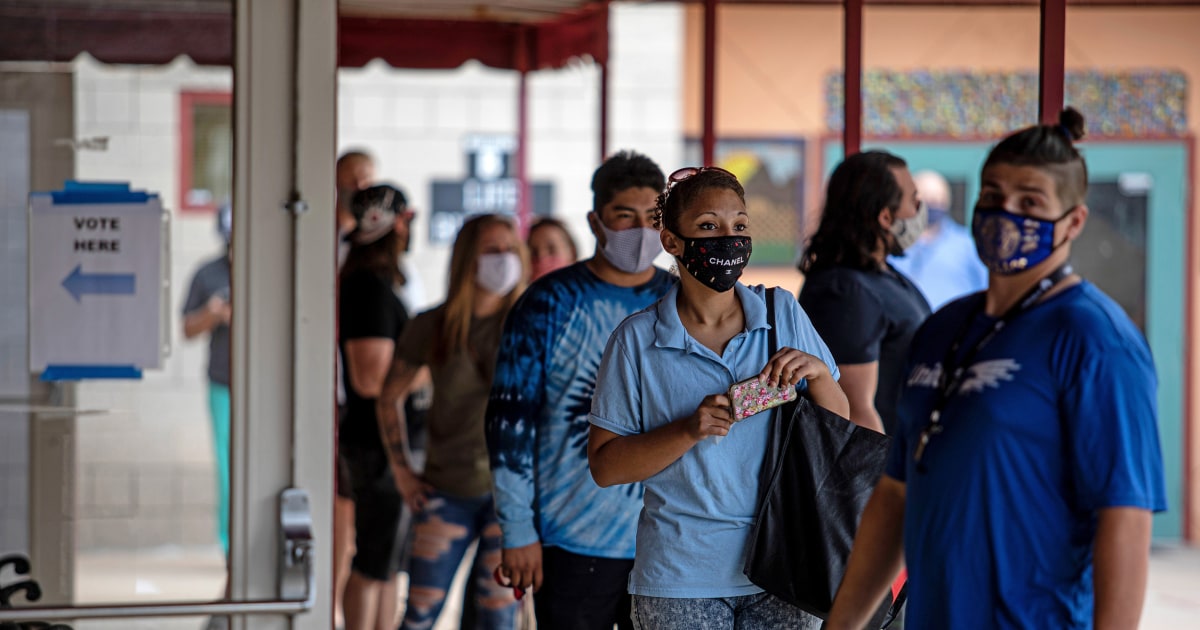
The leader of a Latino civil rights group denounced the Supreme Court’s ruling on two restrictive Arizona voting laws, saying they are grounded in the “Big Lie of Donald Trump”.
On Thursday, the Supreme Court upheld the 2016 laws, 6-3, that experts say make it harder for people of color to challenge voting laws.
Thomas Saenz, president and general counsel of the Mexican American Legal Defense and Educational Fund, said the ruling makes clear that the high court is “woefully disconnected from social and historical reality, particularly when it comes to the experiences of minorities who continue to face daily depredations of basic rights in our country.”
MALDEF led the fight to extend the 1965 Voting Rights Act to Mexican Americans and other Latinos.
Justice Samuel Alito, who wrote the majority opinion, accepted the legitimacy of concerns of voter fraud being committed by people who are ineligible to vote or that voters are being intimidated or coerced, Saenz said in a statement the group issued Thursday.
“We should all be disturbed that two-thirds of our justices would accept, without apparent question, legislative intentions that have more grounding in the Big Lie of Donald Trump than in any measure of demonstrable social-science truth,” he said.
The court “lives in a world of right-wing soundbite rather than the real world of lived experience,” he said.
Saenz also noted that the ruling was on laws that came out of Arizona, “a heavily and increasingly Latino state, whose presidential election vote was fodder for the reckless challengers in Congress who acted despite a dangerous and unprecedented attempt at insurrection on January 6.”
The deadly attack on and destruction in the Capitol was led in part by white supremacist groups and is believed to have been egged on by then-President Donald Trump. It followed objections by Rep. Paul Gosar, R-Ariz., and Sen. Ted Cruz, R-Texas, to the vote tally of Arizona, where Latinos’ improved turnout helped Democrats win the presidential race for the first time in about a quarter century.
One of the 2016 laws at the center of the ruling makes it a crime for anyone other than voters, their families or caregivers to drop off or deliver their mail-in ballots. The other allows election officials to throw out ballots cast at the wrong precinct, even if by accident.
“The evidence of significant voter fraud is simply nonexistent,” Saenz said.
“What we have seen is the increasing participation of Arizona Latinos in voting, despite decades and decades of attempts to suppress their participation,” he said.
He said his group is calling on leaders, including judicial leaders to reject even “implicit acquiescence in the false and damaging narrative that questions the legitimacy of a dramatically growing Latino vote in the United States.”
Alito said in his opinion that even though the laws may have a different impact on minority voters, that difference does not mean access to voting is not “equally open” or “does not give everyone an equal opportunity to vote.”
“Another obstacle for people to be able to vote”
The law limiting who can drop off or deliver a person’s mail-in ballot, which was in effect for the 2020 election, struck at Latino and other groups who have helped increase Latino voter turnout by going door-to-door to speak to people who do not regularly vote or had never voted.
Community groups like Living United for Change in Arizona, or LUCHA, have drawn many young Latinos to work as volunteers for the door-to-door canvassing, that also includes registering Latino voters.
In Arizona, about 1.2 million of eligible voters were Latino and they made up about a quarter of eligible voters in the state in 2020.
The groups have been mobilizing Latino voters for about a decade. They’ve been spurred in part by the racist and anti-immigrant policies of Joe Arpaio, the former sheriff of Maricopa County, and by SB 1070, which allowed law enforcement to racially profile Latinos.
Along with providing potential voters information on political issues, community groups offer rides to polls, hold mobilization events that draw on the culture and on Latino leaders, and help Latinos overcome obstacles that prevent or keep them from voting.
“Arizona isn’t a city where traditionally every house has a mailbox. Sometimes in neighborhoods, you have to walk up towards a mile to be able to drop off outgoing mail. Once again, it’s another obstacle for people to be able to vote,” said Tomas Robles, co-executive director of LUCHA, the progressive group that mobilizes Latino voters.
He said once voters make a choice, LUCHA workers drop off their sealed and signed ballots at the mailbox or a county election or other office.
“This led to an increase in turnout among older Latinos and other Latinos, and as a response to that, Republicans created a term called ‘ballot harvesting’, playing on fears when there was no evidence. They have yet to show any evidence of voter fraud,” he said.
When the law prohibiting groups from offering the ballot delivery services was being debated in the Arizona Legislature, GOP lawmakers could not provide evidence of fraud, azcentral.com reported at the time.
But GOP lawmakers said that even if there is no evidence of fraud, people believe fraud does happen and that erodes faith in the voting system’s integrity.
Robles said the success of the work of his group and that of others led to the law.
“The reason why they passed these (2016) laws was an increased voter turnout in 2012 and voter election turnout in 2013,” he said.
“These are all just drummed up falsehoods by a party that is seeing themselves lose grip on the state because of the changing demographics, because Latinos are building political power and because they (the GOP) can no longer control the chambers and the Legislature at the will of the rich,” he said.
For example, he said, Arizona Gov. Doug Ducey signed a law this year that will make it harder for people who don’t vote regularly to get a mail-in ballot.
To be on the list to get such ballots, Arizonans have to have voted by mail in the last two election cycles or they will be removed from the list. They’ll get a notice from election officials and have 90 days to respond before their removal.
Robles noted that Republicans created the permanent early voting list because too many senior citizens were having trouble standing in line. But now that people of color and young people are using the list, and helping their families vote, “they’re seeing it as a detriment to their overall vision of the state.”
Arizona was second to Texas in the number of polling places it had closed since a Supreme Court ruling gutted the Voting Rights Act, according to a 2019 report by The Leadership Conference Education Fund. The group found Arizona closed 302 polling places after that 2013 Supreme Court ruling.
Arizona has moved to allowing people to cast a ballot at any vote center, rather than assigning precincts, but some counties continue to use precinct assignments.
“We have to adjust”
The closing of precincts opens voters to confusion and mistakes. The 9th U.S. Circuit Court of Appeals found that Arizona changes voting locations more often in minority communities and the rates of discarded votes cast in the wrong precinct were far higher in Arizona than other states, The Washington Post reported.
Robles said maintaining and improving Latino turnout in the shadow of Thursday’s ruling and the latest restrictions on voting will require a much longer engagement effort. Mobilizing will have to start even sooner for the next election and require deeper investment, he said.
“What we have to do now, we have to adjust to the fact that we can’t depend on the Supreme Court to rule in a just manner,” he said. “We have to continue to be diligent about engaging voters around what’s happening in the state and what’s happening in elections and get them ready.”
He added that Democrats need to pay a lot more attention to Latino voters.
“We have to do better at talking to both men and women whose No. 1 priority is the economy, and I think that President Biden did not do a good job of that during the campaign, but there were enough Latinos that could not stand Trump’s rhetoric to overshadow Latinos that were moving away from the party,” Robles said.
Saenz said the court fights aren’t over and warned that legislators should not consider the Supreme Court ruling as “providing free scope to suppress minority voters.”
Follow NBC Latino on Facebook, Twitter and Instagram.
Source: | This article originally belongs to Nbcnews.com










